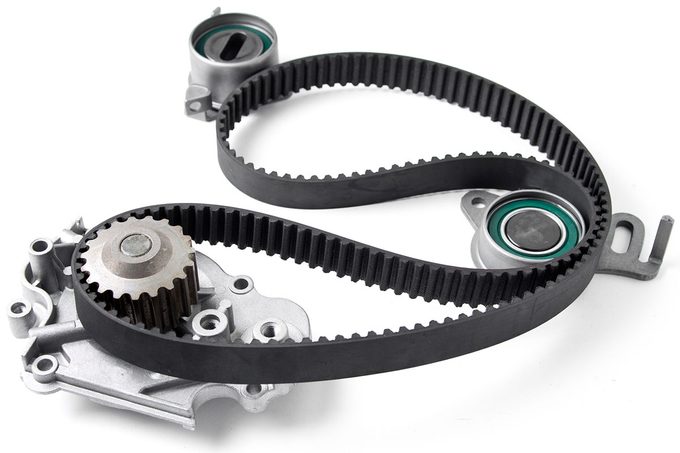How Much Does a Timing Belt Cost for a Car
Have you ever wondered if it's time to replace a timing belt? For the answer, listen to your engine and follow your vehicle's maintenance schedule.
Timing belts themselves are relatively inexpensive but can easily cause thousands of dollars of damage if they break while the engine is running.
Engines come in two configurations: Interference and non-interference. When a timing belt fails the camshaft(s) stops turning and the valves stop moving, but the crankshaft still rotates for a few seconds. An interference engine has insufficient clearance between the valves and pistons. Because the crankshaft keeps rotating, pistons will slam into any valves stuck in the open position, causing catastrophic engine damage. A timing belt failure in a non-interference engine will leave you inconveniently stranded.
Timing belts are a maintenance item; they can wear out and fail without warning. Check your owner's manual. It pays to know which kind of engine you have and the recommended replacement intervals.
What Is a Timing Belt?
A timing belt is similar to an engine drive belt, except timing belts have teeth. In many engines, timing belts have replaced metal timing chains (similar to a bicycle chain) connecting the camshaft and crankshaft gears. The camshaft and crankshaft must work in perfect harmony, called valve timing, during the four-stroke combustion cycle (intake, compression, power, exhaust).
Engines using timing chains can also be interference or non-interference engines. Timing belts are usually molded from rubber or neoprene, have strong fibers or steel running the length of the belt (similar to a tire) and produce less noise than metal timing chains. This makes them strong and durable. But they don't last forever.
 Stas_V/Getty Images
Stas_V/Getty Images
How Can You Tell a Timing Belt Needs To Be Replaced?
Consult a repair manual to see if you can easily remove the timing belt cover. A repair manual is different from an owner's manual because it lists step-by-step repair procedures. Most auto parts stores carry vehicle repair manuals, and many lend them to their customers at no cost.
Many timing belt covers are difficult reach, making visual access to the belt impossible. If you can't get to the cover without taking half the engine compartment apart, leave it to the pros to determine if your vehicle's timing belt needs to be replaced.
If you can get to the belt, it should be taut, with about a 1/4-in. to 1/2-in. deflection when pressed with your thumb along its longest run between gears. It should be smooth and flat (no rounded edges), not glossy or shiny, have no chunks missing, be free of large cracks or peeling and show no signs of fraying. Small surface cracks are okay, but spider cracking on the surface signals extreme wear.
Replace the belt if any teeth are missing or contaminated by an oil or coolant leak.
How Often Should a Timing Belt Be Replaced?
There is no simple answer. First, check your owner's manual for the recommended maintenance schedule. Some manufacturers recommend replacing the timing belt every 30,000 miles, while others suggest 120,000 miles. Several other factors should be part of the equation when considering replacing a timing belt, including:
- Engine performance I: A poor running engine could indicate a loose timing belt skewing engine valve timing.
- Engine performance II: Engine misfire from a bad spark plug wire or coil places undo stress on a timing belt, shortening its life.
- Clicking or squealing noise from the front of the engine: Missing teeth can cause a timing belt to make a clicking noise. A weak or defective timing belt tensioner or glazed idler pulley will produce high-pitched squealing, rattling or squeaking noises.
- Driving conditions: Lots of city stop-and-go driving, heavy acceleration and extreme temperatures place additional stress on timing belts.
- Common sense: If you buy a used car with more than 50,000 miles and the seller cannot show proof the timing belt was ever replaced.
How Much Does DIY Timing Belt Replacement Cost?
Timing belt replacement should be left to the pros. It can be complicated to replace the timing belt on most engines, especially those with dual camshafts or lots of drive accessories that need to be removed.
In many cases, special tools are needed to correctly install a timing belt. Plus, other parts may need replacing. Timing gear indexing (precisely aligning the camshaft gears and crankshaft gear to the manufacturers specs) is critical. Even if one gear is one tooth "off," engine valve timing will be out of sync, damaging your engine or causing it to run rough.
However, if you insist on replacing a timing belt yourself:
- Review a repair manual before starting and keep it handy.
- Ensure you have the correct tools, including any specialty tools needed to adjust the belt tension to eliminate belt deflection.
- Set aside an entire day.
- Plan to replace the drive belts ($25 to $75), change the motor oil and filter ($15 to $50) and, if replacing the water pump, flushing the cooling system ($10 to $45).
It pays to buy a timing belt kit rather than the individual items. Depending on the specific make and model, a typical timing belt kit ($100 to $500) includes a timing belt, timing belt tensioner, idler gears or pulleys, water pump, gaskets, O-rings and seals and other hardware.
Whether you or your mechanic replaces the timing belt, it's always a good idea to replace these other components at the same time.
How Much Does Professional Timing Belt Replacement Cost?
The price the pros charge to replace a timing belt ($350 to $1,500) varies depending on the engine, make, model and year. It also matters whether an independent repair shop or dealer's service department makes the repair.
ⓘ
How Much Does a Timing Belt Cost for a Car
Source: https://www.familyhandyman.com/article/when-to-replace-your-timing-belt/
0 Response to "How Much Does a Timing Belt Cost for a Car"
Post a Comment